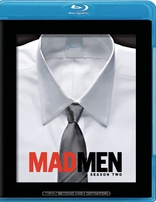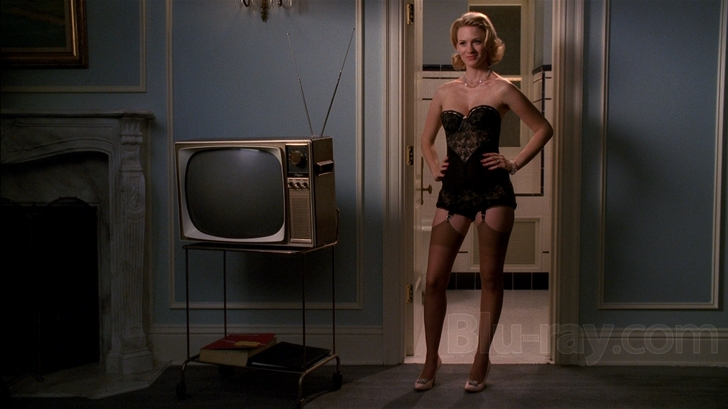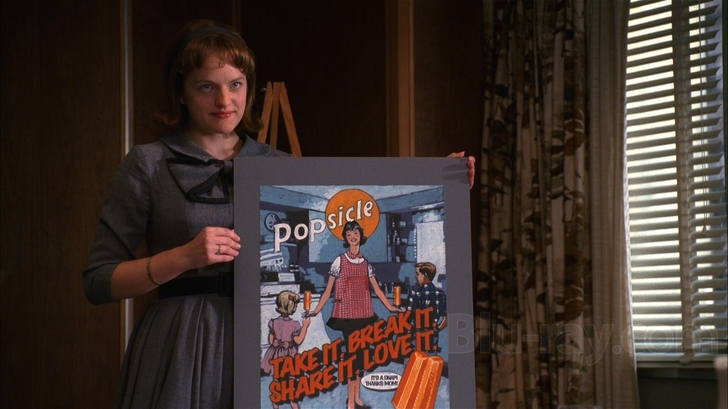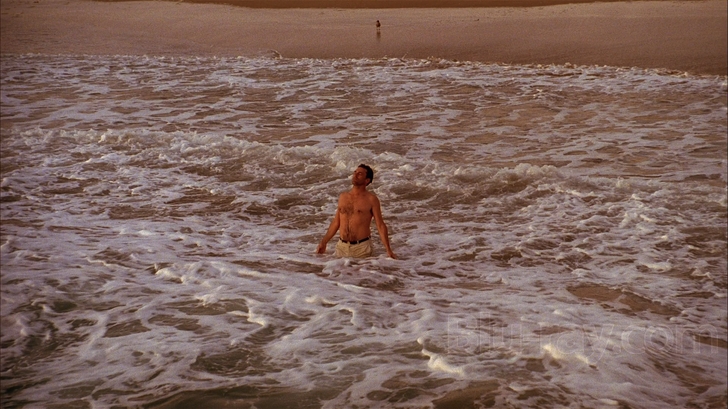Mad Men: Season Two Blu-ray Movie
HomeMad Men: Season Two Blu-ray Movie 
Lionsgate Films | 2008 | 616 min | Rated TV-14 | Jul 14, 2009
Movie rating
8.5 | / 10 |
Blu-ray rating
| Users | 4.8 | |
| Reviewer | 5.0 | |
| Overall | 4.8 |
Overview
Mad Men: Season Two (2008)
What you are, what you want, what you love doesn't matter. It's all about how you sell it. Mad Men delves into the lives, loves and ambitions of a group of ruthlessly competitive men and women working in a 1960s advertising agency. Set on and around Madison Avenue - home of New York's ad agencies at the time, and the "Mad" of the title - the series was created by Sopranos writer Matthew Weiner and has gained rave reviews in the US. The series revolves around the complicated world of Don Draper, the biggest ad man (and ladies' man) in the business, and his colleagues at the Sterling Cooper Advertising Agency. As Don makes the plays in the boardroom and the bedroom, he struggles to stay a step ahead of the rapidly changing times and the young executives nipping at his heels.
Starring: Jon Hamm, January Jones, Elisabeth Moss, Vincent Kartheiser, Christina HendricksDirector: Phil Abraham, Michael Uppendahl, Jennifer Getzinger, Matthew Weiner, Scott Hornbacher
| Drama | Uncertain |
| Period | Uncertain |
| Dark humor | Uncertain |
| History | Uncertain |
| Romance | Uncertain |
Specifications
Video
Video codec: MPEG-4 AVC
Video resolution: 1080p
Aspect ratio: 1.78:1
Original aspect ratio: 1.78:1
Audio
English: DTS-HD Master Audio 5.1 (48kHz, 24-bit)
Subtitles
English, English SDH, Spanish
Discs
50GB Blu-ray Disc
Three-disc set (3 BDs)
Playback
Region free
Review
Rating summary
| Movie | 5.0 | |
| Video | 4.5 | |
| Audio | 4.0 | |
| Extras | 5.0 | |
| Overall | 5.0 |
Mad Men: Season Two Blu-ray Movie Review
TV's (arguably) best drama gets another excellent Blu-ray release.
Reviewed by Casey Broadwater July 13, 2009Fear and desire, death and sex, loss and love—whatever you want to call it, at its core, advertising targets our unconscious, emotional duality. Do we buy whitening toothpaste because we want our clean, attractive smiles to be noticed, or are we simply afraid that co-workers and potential lovers will be disgusted by our yellowy, peg-shaped teeth? Do guys drive flashy cars to attract women, or are they just worried they won’t measure up, so to speak, against other members of their uber-competitive gender? It’s rarely one or the other, and the two feelings are often inexorably linked. As a show about advertising executives coming to grips with their own desires, Man Men casts a keen reflection of both the marketing profession and the dichotomies of human nature. Here in its second season, the show continues to explore the moral and emotional gray area between what we fear and what we want.

Believe it or not, this is an actual screenshot and not a publicity image.
For those who have yet to partake in the nostalgic, but never sentimental splendor of Mad Men, here’s the deal: The show is set in the early 1960’s and follows the conflicted lives of employees at the New York-based, Sterling Cooper advertising agency. The central protagonist is Creative Director Don Draper (Jon Hamm), a man with deep insights into the mind of the American consumer, but plagued by a shady past and a sometimes-troubled family life. As Sterling Cooper tries to gain clients and define itself in the changing times, the characters are pushed and pulled by the mores of their milieu, conforming to and struggling against cultural expectations. To detail the multi-character particulars of the second season’s plot would be a nebulous, fruitless undertaking, so suffice it to say that business deals are struck, extramarital affairs are had, and relationships buckle under the strain. There’s plenty of drama, and despite some criticism that the show moves at a glacial pace, I found the story beats to be perfectly timed. Mad Men is less like a TV program and more like a John Updike or Philip Roth novel, painstakingly unraveling the lives of America’s upper crust.
There’s a quote by David Lynch that I think sums up the undertone of Mad Men’s dramatic conflicts. “My childhood was elegant homes, tree-lined streets…blue skies, picket fences, green grass, cherry trees,” he says. “Middle America as it’s supposed to be. But on the cherry tree there’s this pitch oozing out…and millions of red ants crawling all over it. I discovered that if one looks a little closer at this beautiful world, there are always red ants underneath.” And the characters of Mad Men certainly live in a beautiful world. Post-war America has ridden a wave of economic prosperity, New York is the bustling center of the cosmos, and perfectly trim housewives great their hard-working husbands with a kiss and a cocktail. A whole optimistic generation dreams up a wonderful life between the horrors of World War Two and the nearly interminable hell of Vietnam. Take a closer look, however, and you’ll see the red ants teeming. Our government lambastes the Soviets for running an oppressive regime, while southern cops sic attack dogs on African-American protestors. Men suffer from stuffed-shirt syndrome, slaving away as replaceable cogs in the corporate machine. And women buy into the domestic goddess propaganda, but can’t see a shrink when they feel imperfect, for fear of shame. All the while, no one wants to acknowledge the problems, sweeping them instead under the rugs of patriotism, job satisfaction, and marital bliss.
Indeed, the “M” that transforms ad men into Mad Men might as well stand for marriage. Season two finds nearly all the wedded characters in figurative hot water. Young account executive Pete Campbell (Vincent Kartheiser) bickers with his barren bride, who wants desperately to adopt a child. Senior partner Roger Sterling (John Slattery) resumes his philandering by trading his long-suffering wife for a newer, shinier model. And closeted homosexual Sal Romano (Bryan Batt) pines after the literary-minded Ken Cosgrove (Aaron Staton), while his wife languishes, invisible and unloved. The main story arc, however, is still the relationship between Don and Betty Draper (January Jones). Feeling impotent in both the boardroom and the bedroom, Don indulges himself with a comedian’s wife, while still wearing a friendly face at home. As it always does, the truth comes out, and Betty spirals into a wine-fueled depression before reemerging as a woman who demands independence, even when she needs Don’s help the most.
In their own ways, many of the other female characters mirror Betty’s long slog through subservience before coming to a place of empowerment. Tenuous empowerment, perhaps, but power nonetheless. Peggy (Elisabeth Moss), the once lowly secretary, is a prime example. She has a meteoric rise through the ranks of Sterling Cooper, thanks to a gradual awareness of her own identity. By the season’s end she doesn’t ask, but actually demands a full-sized office of her own. With less than a year before Betty Friedan publishes The Feminine Mystique in 1963, setting off the second wave of feminism, it’s clear that the Mad Men are going to have to contend with some mad, and newly liberated women in future seasons.
The best televisions shows, I think, are ones that diverge from the episodic, story-of-the- hour plots that characterize programs like CSI or Law and Order. As a medium, television isn’t exactly the most immersive—commercial breaks, channel changing, and the sheer onslaught of programming all distance the viewer from the material—but for those with the patience, shows with overarching, interconnected narratives can provide an almost novelistic experience. Mad Men, for my money, is probably the most literary of the lot, not only in the all-encompassing, mid-century story that it tells, but also because of the nearly unbelievable attention to detail inherent in the series. Costumes, props, and sets are all note-perfect. The scripts surge with subtext and allow character to take precedent over action. Relationships and rivalries are well-developed and even bit parts feel authentic. The acting too is subtle and sublime. I saw on imdb.com that Jon Hamm is routinely savaged for being “wooden” in his portrayal of Don Draper. I think he’s simply phenomenal—perfect casting really—and he brings a stoic sense of repression to the role that completely jives with the male certitude of the times. It’s no stretch to say that Mad Men is one of the best dramas on television now, and it’s certainly the best among basic cable and network offerings, in my opinion. Only HBO can compete with narratives of this caliber.
Mad Men: Season Two Blu-ray Movie, Video Quality 

Much like the first season, Mad Men Season Two looks stunning on Blu-ray, as its 1080p, AVC-encoded transfer is a revelation of clarity, color, and warmth. The cinematography of the series is essential to capturing the mood of the early 1960's, and the tonal palette that Matt Weiner and the production designers have implemented is vivid and accurate. Witness the soft, velvety beige of nylon stockings and the rich mahogany hues of wood paneling. See the slate grey flannel suits and the muted blues of the Sterling Cooper offices. Watch as secretaries saunter by in summer grass greens and pout with plump, cherry red lips. Sumptuous doesn't even begin to describe Mad Men's luscious, booze-soaked look. Black levels are strong throughout—just examine Don's sleek, bituminous haircut—and the image is as sharp and well defined as the ad man's crisp linen suits, without exhibiting any signs of edge enhancement. The presentation is topped off by a thin veneer of grain that gives Mad Men a warm, lived-in look. Only a meager smattering of issues keeps the transfer from getting the highest marks. I noticed a few instances of wavering—mostly on flat, colorless walls—and there are a handful of scenes where grain levels spike and give the image a softer look than usual. Additionally, whites from light sources—like sunlight through curtains—are frequently overblown, though this is a source-related issue and probably won't bother too many people. I actually enjoyed the look, as the hot whites give a sense of natural lighting that's often lost when productions try to light everything evenly. As a whole, this is a simply beautiful transfer that really helps to sell Mad Men's period-piece authenticity.
Mad Men: Season Two Blu-ray Movie, Audio Quality 

Though it's not as immediately remarkable as the video quality, Mad Men's DTS-HD Master Audio 5.1 track is clear and precise, making the most out of what is essentially a low-on-action, high-on-dialogue television series. While it will never get your chest throbbing with LFE rumble or provide "I felt like I was there" levels of immersion, Mad Men nevertheless impresses with consistent clarity and a stalwart, well-balanced mix that certainly has its priorities straight. Voices carry with clean confidence. Sound effects, like the clinking of ice in a whisky-filled glass, are authentic and never seem canned. Rear channels are frequently used for the fantastic score, but if you listen closely you'll also find quiet, ambient noises giving an ever so subtle roundness to the sound field, from the distant clatter of typewriter keys to muffled voices from another room. And can I just say how absolutely awesome the theme song is?
Mad Men: Season Two Blu-ray Movie, Special Features and Extras 

Lionsgate and AMC have once again loaded up a season of Mad Men with an almost
insane array of special features that could literally eat up an entire day of your life.
An Era of Style (1080p, 21:44)
Fashion is an indelible part of Mad Men's authentic charm, and this feature takes us
through three eras of 1960's style, with archival footage and interviews from a number of fashion
designers and historians. The "classic era" of the late 50's and early 60's was defined by a
"conservative but highly consumerist" sense of style and influenced by Dior's post-WWII "New
Look." 1964 through 1967 gave us the youthful, mini-skirt styles of the "modern era," and the
late sixties were characterized by the hippy movement, which rejected consumerism in favor of
thrifty individuality. This is a short, engaging documentary, but I wish they had chosen to dissect
more of the costumes from Mad Men itself, instead of just giving a historical overview. If
anything, "An Era of Style" gives us a look at the potential fashions of future Mad Men
seasons.
Birth of an Independent Woman: (1080p, 43: 09 total)
Speaking of the future, it's clear that Mad Men's women aren't going to take the sexual
harassment, overt chauvinism, and domestic imprisonment for much longer. As the series
approaches Betty Friedan's publication of The Feminine Mystique and the world feels the
first turnings of the sexual revolution, I sense seasons three and (hopefully) four will find the
female characters increasingly liberated. This hefty, foreshadowing feature is broken into two
segments that combine archived film with talking-head interviews from a variety of writers and
professors of feminism. Part One (19:50) deals with gender roles during and after World War Two
—before the second wave of feminism in 1963—and examines some of the outright propaganda
that kept women "in their place." Then, Betty Frieden came along and called a spade a spade.
Well, she called the issue sexism, anyway, and finally there was a name for what women
had been experiencing for, uh, ever. Part Two (23:19) continues to examine the burgeoning
feminist movement of the mid-1960's, especially as it related to concurrent civil rights
developments.
Time Capsule: Historical Events of the 1960's
This clever and well-integrated feature allows you to scroll through a list of episodes and then
select historical topics that are relevant to each one. For example, episode 10, "The Inheritance"
finds Paul Kinsey deciding to join the Freedom Riders. If you click on the "Freedom Riders" tab, a
short video then plays that gives some information about the subject, and provides some
appreciated context for those who have a rusty sense of history. Each episode has two or three
topics, ranging from a chronicle of the Utz potato chip company, to the curator of MOMA
discussing the artistic impact of Rothko's paintings. Not all of the topics lead to videos, however.
Many of them simply bring up a timeline, like the biography of Bob Dylan, or a list, like The Top
Ten Films of 1962. There's a wealth of material here though—33 topics in all—and patient
viewers will find a lot to love. Highlights include Maurince Reznik, the CEO of Maidenform,
discussing the company's controversial advertising, and Andre Soltner, owner of the Lutece
restaurant, demonstrating how to make an apple tart.
Mad Men Season Two Music Sampler
This is really just a plug for Mad Men's soundtrack, and it includes 30-second samples of
eight songs featured on the show.
Audio Commentaries
Each episode of Mad Men Season Two comes equipped with not one, but unbelievably,
two full-length audio commentaries, amounting to 1,222 minutes—yes, over 20
hours—of dissection, discussion, insight and humor from the cast and crew. Series creator Matt
Weiner is present for every episode except "The New Girl," and his tracks are, subjectively, the
most rewarding and engaging. I wouldn't say any of the commentaries are absolutely essential,
but this truly is a set of discs that keep on giving, and Mad Men fanatics will find plenty to dig
through during the hiatuses between seasons. Here's what you get:
"For Those Who Think Young"
Track 1—Matt Weiner
Track 2—Jon Hamm and January Jones
"Flight 1"
Track 1—Matt Weiner and Jon Hamm
Track 2—Writer Lisa Albert and Vincent Kartheiser
"The Benefactor"
Track 1—Matt Weiner
Track 2—Director Lesli Linka Glatter, Melinda McGraw, and Rich Sommer
"Three Sundays"
Track 1—Matt Weiner, and Writers Maria and André Jacquemetton
Track 2—Elisabeth Moss and Colin Hanks
"The New Girl"
Track 1—Director Jennifer Getzinger and Writer Robin Veith
Track 2—John Hamm, Elisabeth Moss, and Melinda McGraw
"Maidenform"
Track 1—Matt Weiner and Costume Designer Janie Bryant
Track 2—Director Phil Abraham and Mark Moses
"The Gold Violin"
Track 1—Matthew Weiner and January Jones
Track 2—Advertising Consultant Bob Levinson and Bryan Batt
"A Night to Remember"
Track 1—Matt Weiner and Writer Robin Veith
Track 2—Director Lesli Linka Glatter and January Jones
"Six Month Leave"
Track 1—Matt Weiner and Director Michael Uppendahl
Track 2—John Slattery and Joel Murray
"The Inheritance"
Track 1—Matt Weiner and Writer Lisa Albert
Track 2—Jon Hamm, January Jones, and Vincent Kartheiser
"The Jet Set"
Track 1—Matthew Weiner, Director Phil Abraham, and Composer David Carbonara
Track 2—Executive Producer Scott Hornbacher, Production Designer Dan Bishop, and Set
Decorator Amy Wells
"The Mountain King"
Track 1—Matthew Weiner, Post-production Supervisor Black McCormick, and Sound Effects
Supervisor Jason George
Track 2—Christina Hendricks and Robert Morse
"Meditations in an Emergency"
Track 1—Matt Weiner and Elisabeth Moss
Track 2—Writing Assistant Kate Gordon, Elisabeth Moss, and Vincent Kartheiser
Mad Men: Season Two Blu-ray Movie, Overall Score and Recommendation 

There's a beautiful moment in the season's penultimate episode when Don Draper steps into the ocean, letting the waves rush over his head. It's a literal and symbolic baptism, showing that he's washed himself of his misdeeds and is ready to start anew. With the third season of Mad Men airing in a little over a month, I'm curious to see if Don can keep his promises. If you've never seen the show, grab seasons one and two—they're both reasonably priced—and get caught up before the new episodes start. Mad Men is one of the most rewarding, engaging, and well-constructed programs on television, and I have no problem giving it my absolute highest recommendation.
Other editions
Mad Men: Other Seasons

Mad Men: Season One
2007

Mad Men: Season Three
2009

Mad Men: Season Four
2010

Mad Men: Season Five
2012

Mad Men: Season Six
2013

Mad Men: Season Six
2013

Mad Men: The Final Season, Part 1
2014

Mad Men: The Final Season, Part 1 with Exclusive Bonus Content
2014

Mad Men: The Final Season, Part 2
2015
Similar titles
Similar titles you might also like

Milk
2008

Good Night, and Good Luck.
2005

Selma
2014

Phantom Thread 4K
First pressing in clear case
2017

Carol
2015

A Serious Man
2009

Show Me a Hero
2015

Saturday Night and Sunday Morning
1960

Desert Hearts
1985

Sunday Bloody Sunday
1971

Daisy Miller
Special Edition
1974

Hi, Mom!
1970

Elizabeth 4K
1998

John Adams
2008

Shadows
1958

Reds
40th Anniversary Edition
1981

The Favourite
2018

Cold War
Zimna wojna
2018

The Other Boleyn Girl
2008

The Ides of March
2011